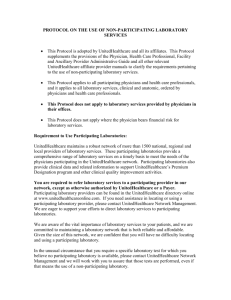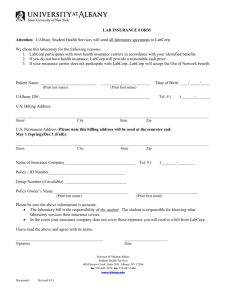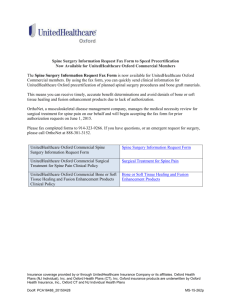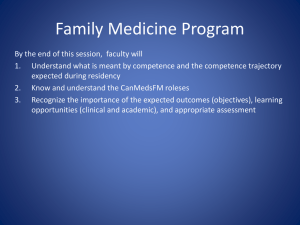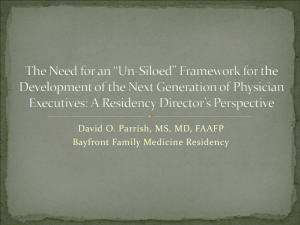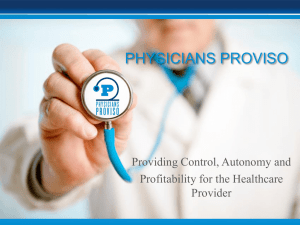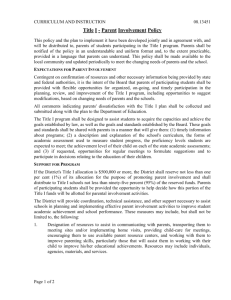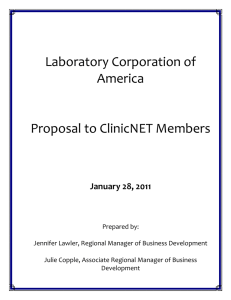National Laboratory Program
advertisement
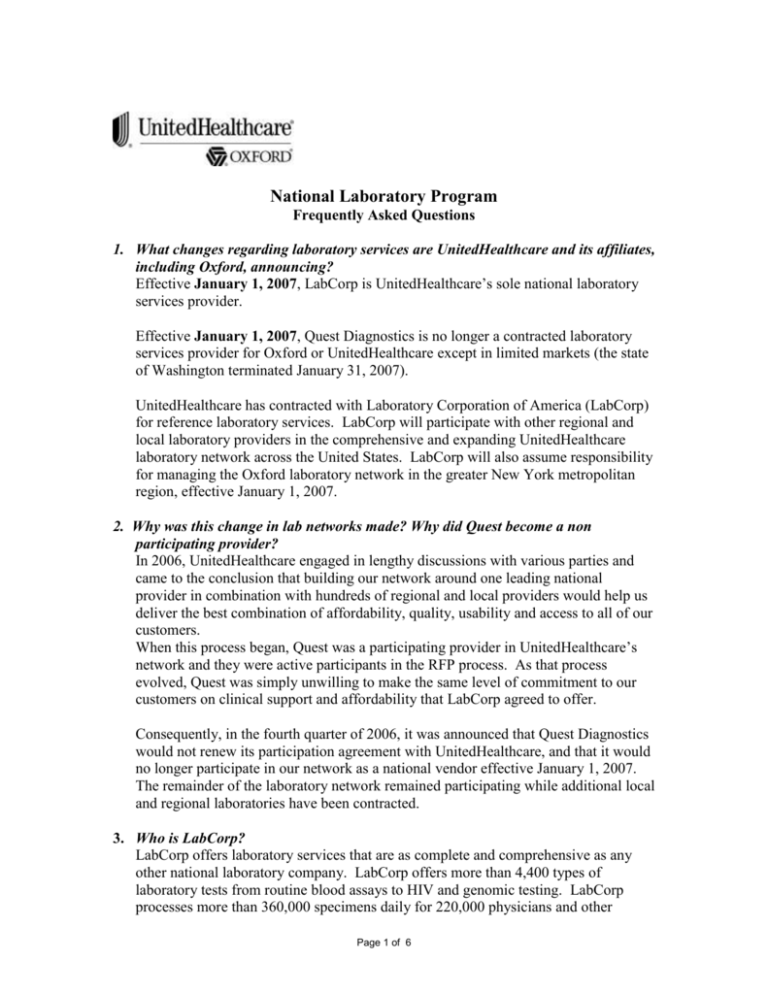
National Laboratory Program Frequently Asked Questions 1. What changes regarding laboratory services are UnitedHealthcare and its affiliates, including Oxford, announcing? Effective January 1, 2007, LabCorp is UnitedHealthcare’s sole national laboratory services provider. Effective January 1, 2007, Quest Diagnostics is no longer a contracted laboratory services provider for Oxford or UnitedHealthcare except in limited markets (the state of Washington terminated January 31, 2007). UnitedHealthcare has contracted with Laboratory Corporation of America (LabCorp) for reference laboratory services. LabCorp will participate with other regional and local laboratory providers in the comprehensive and expanding UnitedHealthcare laboratory network across the United States. LabCorp will also assume responsibility for managing the Oxford laboratory network in the greater New York metropolitan region, effective January 1, 2007. 2. Why was this change in lab networks made? Why did Quest become a non participating provider? In 2006, UnitedHealthcare engaged in lengthy discussions with various parties and came to the conclusion that building our network around one leading national provider in combination with hundreds of regional and local providers would help us deliver the best combination of affordability, quality, usability and access to all of our customers. When this process began, Quest was a participating provider in UnitedHealthcare’s network and they were active participants in the RFP process. As that process evolved, Quest was simply unwilling to make the same level of commitment to our customers on clinical support and affordability that LabCorp agreed to offer. Consequently, in the fourth quarter of 2006, it was announced that Quest Diagnostics would not renew its participation agreement with UnitedHealthcare, and that it would no longer participate in our network as a national vendor effective January 1, 2007. The remainder of the laboratory network remained participating while additional local and regional laboratories have been contracted. 3. Who is LabCorp? LabCorp offers laboratory services that are as complete and comprehensive as any other national laboratory company. LabCorp offers more than 4,400 types of laboratory tests from routine blood assays to HIV and genomic testing. LabCorp processes more than 360,000 specimens daily for 220,000 physicians and other Page 1 of 6 clients. LabCorp is well-regarded for its complex testing capabilities related to oncology, infectious disease, and genomic, esoteric, or anatomic pathology. In addition, LabCorp operates several affiliated Centers of Excellence including the Center of Esoteric Testing in Burlington, NC; the Center for Molecular Biology and Pathology in Research Triangle Park, NC; the Center for Occupational Testing in Research Triangle Park, NC; National Genetics Institute in Los Angeles, CA; and ViroMed in Minneapolis, MN. LabCorp has an excellent reputation for providing outstanding customer service. An explicit goal of this new relationship between UnitedHealthcare and LabCorp, however, is to improve the diagnostic and administrative support provided to UnitedHealthcare participating physicians. As such, LabCorp is accountable to ensure that UnitedHealthcare and Oxford network physicians receive a level of service commensurate with that offered by any other laboratory. UnitedHealthcare will monitor that performance based upon our own review and input from participating physicians. Given the importance of simplifying the administrative burden of ordering and receiving diagnostic tests and results, LabCorp provides a variety of electronic interfaces that may be of interest to you. Their systems are compatible with the electronic connectivity software used by most medical practices today, and we encourage physicians to evaluate the applicability for their practice. If physicians desire the comprehensive services and special capabilities of LabCorp, effective January 1, 2007, and are not currently a customer, they may simply contact LabCorp. 4. With LabCorp becoming UnitedHealthcare’s and its affiliates national laboratory services provider, will Quest Diagnostics still be a participating provider? As of January 1, 2007, (January 31, 2007, for the state of Washington) Quest Diagnostics will no longer be a contracted laboratory and will be considered a nonparticipating provider except in limited markets. There are no ongoing or planned contract negotiations with Quest Diagnostics at this time. 5. Why is Quest, or any non-par provider an issue? When our Members use non-par providers like Quest, the cost of each lab service is dramatically more than when they use a participating provider. (These concerns were well-founded. Our claims data indicate that Quest is now billing our customers more than 6-7 times what they pay participating laboratories for the same services on an innetwork basis.) 6. How will this change affect physicians? Physicians who currently refer UnitedHealthcare or Oxford patients or their lab specimens to Quest Diagnostics for laboratory services, as of January 1, 2007, must use LabCorp or another participating laboratory. For physicians who are already Page 2 of 6 using LabCorp or another participating laboratory, this development will have no significant effect on their practice. We strongly urge physicians and their practice staff to make any necessary arrangements with LabCorp or another participating laboratory. Physicians who rely on patient service centers to secure lab specimens should ensure those centers are in the UnitedHealthcare and/or the Oxford network. 7. How will this change affect Oxford members? As long as physicians use one of the many Oxford participating laboratories, there will be no effect on the patient who is an Oxford member. However, after January 1, 2007, if patients or their specimens are referred to non-participating laboratories (including Quest Diagnostics), then Oxford members who are your patients may be subject to higher health care costs due to the nature of the various health care benefit plans offered and selected by purchasers and consumers. This would be an unfortunate result of inattentiveness to this issue and we desire to do all we can to prevent such consequences. Patients are generally unaware of which laboratory service their physicians use. In 80% of cases, specimens are collected in a physician’s office and picked up by a courier. Test results are then delivered electronically. In other cases, a physician may refer a patient to a patient service center to have a specimen taken. An important way a physician’s office can help patients control the cost of care is to ensure that lab specimens remain in network with LabCorp or another participating lab provider. We encourage our members to take an active role in their health care and learn which laboratories participate in our network so that together we can minimize any applicable expenses associated with the use of out-of–network providers. 8. What is UnitedHealthcare doing to help physicians use participating laboratories? UnitedHealthcare and Oxford made tens of thousands of phone calls, sent millions of pieces of mail and provided countless electronic notices to members, employers and physicians of this change. As a result, almost all of our participating physicians are only using participating laboratories. We continue to make phone calls and send letters to physicians and members as we identify data suggesting that a non-par lab is being used. We offer assistance to the office to establish an account with a participating laboratory. 9. What is UnitedHealthcare doing to help members and employers get affordable access to laboratory services? UnitedHealthcare has responded to this challenge by working with LabCorp and the 1,500 other reference laboratories in our network to assure adequate access for our customers. As a result of those efforts, LabCorp alone has added more than 400 new patient service centers, and our national laboratory network now features more than 5,600 service centers across the country. Page 3 of 6 10. Will LabCorp be UnitedHealthcare’s and Oxford’s only contracted laboratory provider? In the overwhelming majority of the country, UnitedHealthcare’s laboratory network will continue to include a combination of other regional and local laboratory service providers. In addition, in many areas we will be contracting with new providers and adding to the breadth of our network. LabCorp will be the sole national capitated laboratory services provider for the HMO benefit plans in the markets covered by PacifiCare of Colorado, Neighborhood Health Partnership in Florida, and Mid-Atlantic Medical Services (MAMSI) in Maryland and Virginia. LabCorp is already the exclusive provider for HMO benefit plans for PacifiCare of Arizona. If you have any questions about the 2007 participating labs in your area, you can access a list of them at www.UnitedHealthcareOnline.com at any time. 11. How can physicians obtain a list of 2007 participating laboratories? A current list of 2007 participating laboratories is available online using the 2007 Lab Locator tool at www.oxfordhealth.com. 12. What if there are no conveniently located participating labs? Physicians, customers and members can conveniently find the identity and location of participating laboratories on our Web site. We wish to emphasize, as the protocol itself does, that physicians should call us if they believe there is no participating laboratory that will meet their needs. We will work with them to make sure they have access to the services they need. 13. Will Oxford and UnitedHealthcare have the same laboratory network? Not necessarily. Some labs may be participating for lab services with UnitedHealthcare, but not with the Oxford Laboratory Program. A complete list of 2007 participating laboratories may be accessed as noted above. 14. Are all UnitedHealthcare products included in this arrangement? Yes. The arrangement applies to all UnitedHealthcare commercial plans, as well as acquired plans including PacifiCare, Oxford, MAMSI, Neighborhood Health Partnership, and UnitedHealthcare of the River Valley (formerly known as John Deere Health). 15. Are AmeriChoice and Ovations also included? Yes, AmeriChoice and Ovations, including Secure Horizons products, are included. 16. Is UnitedHealthcare still negotiating with Quest Diagnostics? No, there are no ongoing or planned contract negotiations with Quest Diagnostics at this time. 17. How has UnitedHealthcare and Oxford communicated this change in lab network? Page 4 of 6 We have been engaged for months in active outreach to the physician community on this issue. We have contacted more than 65,000 physicians who had been significant users of Quest to make sure they were aware of the change in our lab network and to assure that a participating laboratory was available to meet their needs. (Physicians can find participating labs in their area on unitedhealthcareonline.com). LabCorp and our other in-network laboratory service providers have been active participants in understanding and responding to the needs of our participating physicians. 18. Why is this protocol necessary? The purpose of the lab referral protocol is not to sanction physicians. Our simple goal is to have physicians refer patient specimens to participating laboratories. As a result of the millions of communications regarding this issue, almost all physicians are doing so at this time. While most physician offices have adjusted to the change, some physicians may choose to continue to use a non-participating lab without a good clinical reason, and without a patient freely choosing to use an out-of-network laboratory. Such a physician office is not working in the spirit of their UnitedHealthcare (or affiliate) participation agreement. The purpose of this protocol is to further emphasize that an office’s elective use of non-par laboratory providers is not consistent with a collaborative relationship. The protocol offers a range of options, short of termination that could be applied in the event that physician declined to work with us in using participating laboratory providers. Our focus remains on outreach, not sanctions as evidenced by the fact that no sanction has yet been applied to any physician. This protocol will have no applicability to the many thousands of physicians who have actively worked with us to find a participating laboratory solution to meet their patients’ needs. We will take action with respect to laboratory referrals only when physicians make continued, material use of non-participating laboratories, and then only after an opportunity to dialogue with those physicians and understand the reasons why non-par laboratories are being used. 19. How was the protocol communicated to physicians? Every participating physician was sent notice of the protocol by postcard. The Protocol on the Use of Non-Participating Laboratory Services has been available since November on www.oxfordhealth.com under Messages on the log in page. 20. Where can I get a copy of this protocol? The Protocol on the Use of Non-Participating Laboratory Services can be viewed in full on www.oxfordhealth.com under Messages on the log in page. 21. How and when will the new protocol be applied? Each situation will be considered on its unique merits and will depend to a great degree on the outcome of our dialogue with the physician. Until such dialogue occurs we cannot say how it will proceed or conclude. The protocol will not be applied to any physician until we have attempted such dialogue. Our goal is to work with physicians to provide cost-effective access to quality clinical services. All of the Page 5 of 6 appeal and dispute resolution rights contained in our participation agreements will be available to any physician to whom the protocol is applied. 22. Will UnitedHealthcare hold physicians responsible if their patients choose an outof-network lab? It is our policy that physicians should not, and will not, be held accountable for these patient-initiated actions. Although physicians make more than 80% of the decisions concerning where their patients go for lab services, occasionally patients will make the choice to use an out-of network lab. Patients who are Oxford members with outof-network benefits can request to use an out-of-network lab provider, although it may significantly increase their costs. We also have done outreach to our highest utilizing members regarding this change in our network of labs and a complete listing of labs is available on our site,www.oxfordhealth.com. Summary After reviewing all the comprehensive services and special capabilities LabCorp has to offer, and given the increasingly broad array of choice among laboratories participating in the UnitedHealthcare and Oxford networks, we are comfortable there will be no compromise of the ability of physicians to order the diagnostic tests necessary to meet the clinical management needs of their patients. If any such issue arises, LabCorp and UnitedHealthcare are prepared to work with physicians and their practice staff to resolve the issue so that the patient covered by UnitedHealthcare and Oxford can be assured access to high quality, affordable health care and a simplified experience. For further information, contact the UnitedHealthcare Customer Service Center at 1-877-842-3210 or Oxford Provider Services at 1-800-666-1353.. Resources www.UnitedHealthcareOnline.com > Policies & Protocols > 2007 Laboratory Network American Academy of Physicians article (http://www.aafp.org/online/en/home/publications/news/newsnow/practice-management/20070307uhclabprotocol.html May 2007 Page 6 of 6
